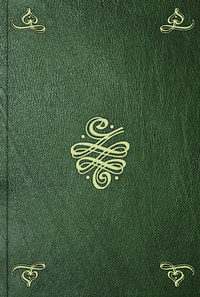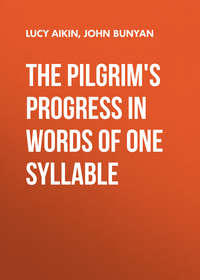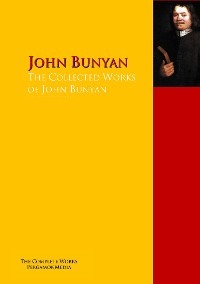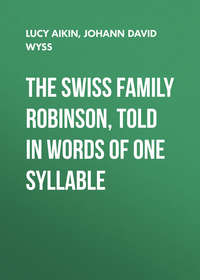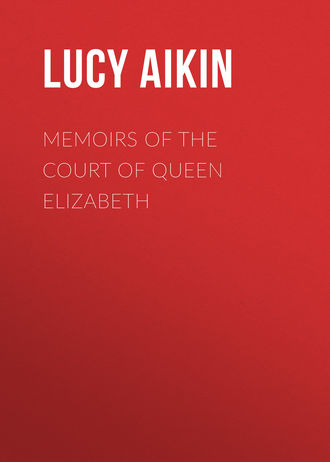 полная версия
полная версияMemoirs of the Court of Queen Elizabeth
The observation of lord Talbot, that the earl of Leicester showed himself more than ever solicitous to improve the favor of his sovereign, received confirmation from the unparalleled magnificence of the reception which he provided for her when, during her progress in the summer of 1575, she honored him with a visit in Warwickshire.
The "princely pleasures of Kennelworth," were famed in their day as the quintessence of all courtly delight, and very long and very pompous descriptions of these festive devices have come down to our times.
They were conducted on a scale of grandeur and expense which may still surprise; but taste as yet was in its infancy, and the whole was characterized by the unmerciful tediousness, the ludicrous incongruities, and the operose pedantry of a semi-barbarous age.
A temporary bridge 70 feet in length was thrown across a valley to the great gate of the castle, and its posts were hung with the offerings of seven of the Grecian deities to her majesty; displaying in grotesque assemblage, cages of various large birds, fruits, corn, fishes, grapes, and wine in silver vessels, musical instruments of many kinds and weapons and armour hung trophy-wise on two ragged staves. A poet standing at the end of the bridge explained in Latin verse the meaning of all. The Lady of the Lake, invisible since the disappearance of the renowned prince Arthur, approached on a floating island along the moat to recite adulatory verses. Arion, being summoned for the like purpose, appeared on a dolphin four-and-twenty feet long, which carried in its belly a whole orchestra. A Sibyl, a "Salvage man" and an Echo posted in the park, all harangued in the same strain. Music and dancing enlivened the Sunday evening. Splendid fireworks were displayed both on land and water;—a play was performed;—an Italian tumbler exhibited his feats;—thirteen bears were baited;—there were three stag-hunts, and a representation of a country bridal, followed by running at the quintin: finally, the men of Coventry exhibited, by express permission, their annual mock fight in commemoration of a signal defeat of the Danes.
Nineteen days did the earl of Leicester sustain the overwhelming honor of this royal visit;—a demonstration of her majesty's satisfaction in her entertainment quite unexampled, but which probably awakened less envy than any other token of her peculiar grace by which she might have been pleased to distinguish her favorite.
No domestic incident had for a long time excited so strong a sensation as the death of Walter Devereux earl of Essex, which took place at Dublin in the autumn of the year 1576. This nobleman is celebrated for his talents, his virtues, his unfortunate and untimely death, and also as the father of a son still more distinguished and destined to a fate yet more disastrous. He was of illustrious descent, deriving a part of his hereditary honors from the lords Ferrers of Chartley, and the rest from the noble family of Bourchier, through a daughter of Thomas of Woodstock youngest son of Edward III. In his nineteenth year he succeeded his grandfather as viscount Hereford, and coming to court attracted the merited commendations of her majesty by his learning, his abilities, and his ingenuous modesty.
During a short period the viscount was joined in commission with the earls of Huntingdon and Shrewsbury for the safe keeping of the queen of Scots. On the breaking out of the northern rebellion, he joined the royal army with all the forces he could raise; and in reward of this forwardness in her service her majesty conferred on him the garter, and subsequently invested him, after the most solemn and honorable form of creation, with the dignity of earl of Essex, long hereditary in the house of Bourchier.
By these marks of favor the jealousy of Leicester and of other courtiers was strongly excited; but with little cause. The spirit of the earl had too much of boldness, of enterprise, of a high-souled generosity, to permit him to take root and flourish in that scene of treachery and intrigue—a court; it quickly prompted him to seek occupation at a distance, in the attempt to subdue and civilize a turbulent Irish province.
He solicited and obtained from the queen, by a kind of agreement then not unusual, a grant to himself and the adventurers under him of half of the district of Clandeboy in Ulster, on condition of his rescuing and defending the whole of it from the rebels and defraying half the expenses of the service. Great things were expected from his expedition, on which he embarked in August 1573: but sir William Fitzwilliams, deputy of Ireland, viewed the arrival of the earl with sentiments which led him to oppose every possible obstacle to his success. Probably, too, Essex himself found, on trial, the task of subduing the Irishry (as the natives of the island were then called) a more difficult one than he had anticipated. Some brilliant service, however, amid many delays and disappointments, he performed in various parts of the country; and having returned to England in 1575 to lay all his grievances before the queen, and face the court faction which injured him in his absence, he was sent back with the title of Marshal of Ireland, an appointment which Leicester, for his own purposes, is said to have been active in procuring him.
Sir Henry Sidney had now succeeded Fitzwilliams as lord-deputy; and from him it does not appear that Essex had the same systematic opposition to encounter: on the contrary, having been applied to by the queen for his opinion of the expediency of granting several requests of the earl relative to this service, sir Henry advised her majesty to comply with most of them, prefacing his counsel with the following sentence: "Of the earl I must say, that he is so noble and worthy a personage, and so forward in all his actions, and so complete a gentleman wherein he may either advance your honor or service, as you may take comfort to have in store so rare a subject, who hath nothing in greater regard than to show himself such an one indeed as the common fame reporteth him; which hath been no more, in troth, than his due deserts and painful travels in the worst parts of this miserable country have deserved78."
Such in fact was the apparent cordiality between the deputy and the marshal, that a proposal passed for the marriage of Philip Sidney to the lady Penelope Devereux daughter of the earl: but if this friendship were ever sincere on the part of sir Henry, it was at least short-lived; for, writing a few months after Essex's death to Leicester respecting the earl of Ormond, whom the favorite regarded as his enemy, he says.... "In fine, my lord, I am ready to accord with him;
but, my most dear lord and brother, be you upon your keeping for him; for, if Essex had lived, you should have found him as violent an enemy as his heart, power and cunning would have served him to have been; and for that their malice, I take God to record, I could brook neither of them both79."
Ireland was, during the whole of Elizabeth's reign, that part of her dominions which it cost her most trouble to govern, and with which her system of policy prospered the least. Without a considerable military force it was impossible to bring into subjection those parts of the country which still remained in a state of barbarism under the sway of native chieftains, or even to preserve in safety and civility such districts as were already reclaimed and brought within the English pale. But the queen's parsimony, or, more truly, the narrowness of her income, caused her perpetually to repine at the great expenses to which she was put for this service, and frequently to run the risk of losing all that had been slowly gained, by a sudden withdrawment, or long delay, of the necessary supplies. Her suspicious temper caused her likewise to lend ready ear to the complaints, whether founded or not, brought by the disaffected Irish against her officers. Sir Henry Sidney himself, the deputy whom she most favored and trusted, and continued longer in office than any other, supported as he was at court by the potent influence of Leicester and the steady friendship of Burleigh, had many causes offered him of vexation and discontent; and those who held inferior commands, and were less ably protected from the attacks of their enemies, experienced almost insupportable anxieties from counteractions, difficulties and hardships of every kind. Of these the unfortunate earl of Essex had his full share.
The hopes of improving his fortune, with which he had entered upon the service, were so far from being realized that he found himself sinking continually deeper in debt. His efforts against the rebels were by no means uniformly successful. His court enemies contrived to divert most of the succours designed him by his sovereign, and the perplexities of his situation went on accumulating instead of diminishing. The bodily fatigue which he endured in the prosecution of his designs, joined to the anguish of a wounded spirit, undermined at length the powers of his constitution, and after repeated attacks he was carried off by a dysentery in September 1576.
Essex was liberal, affable, brave and eloquent, and generally beloved both in England and Ireland. The symptoms of his disease, though such as exposure alone to the pestilential damps of the climate might well have produced, were also susceptible of being ascribed to poison; and one of his attendants, a divine who likewise professed medicine, seeing him in great pain, suddenly exclaimed, "By the mass, my lord, you are poisoned!" The report spread like wild-fire. To common minds it is a relief under irremediable misfortune to find an object for blame; and accordingly, though no direct evidence of the fact was produced, it was universally believed that some villain had administered to him "an ill drink."
As Leicester was known to be his enemy, strongly suspected of an intrigue with his wife, and believed capable of any enormity, the friends and partisans of Essex seem immediately to have pointed at him as the contriver of his death; yet I find no contemporary evidence of the imputation, except in the conduct of sir Henry Sidney on this occasion, which indicates great anxiety for the reputation of his patron and brother-in-law.
The lord-deputy was unfortunately absent from Dublin at the time of the earl of Essex's death, and before he could institute a regular examination into the manner of it, a thousand false tales had been circulated which were greedily received by the public. On his return, however, he entered into the investigation with great zeal and diligence:—the decisive test of an examination of the body was not indeed applied, for it was one with which that age seems to have been unacquainted; but many witnesses were called, reports were traced to their source and in some instances disproved, and the result of the whole was transmitted by the deputy to the privy-council in a letter which appears satisfactorily to prove that there was no solid ground to ascribe the event to any but natural causes. That the deputy himself was convinced of the correctness of this representation is seen from one of his private letters to Leicester, published long after in the "Sidney Papers."
In all probability, posterity would scarcely have heard of this imputation on the character of Leicester, had not his marriage with the widow of Essex served as corroboration of the charge, and given occasion to the malicious comments of the author of "Leicester's Commonwealth." This union, however, was not publicly celebrated till two years afterwards; and we have no certain authority for the fact of the criminal connexion of the parties during the life of the earl of Essex, nor for the private marriage said to have been huddled up with indecent precipitation on his decease.
Walter earl of Essex left Robert his son and successor, then in the tenth year of his age, to the care and protection of the earl of Sussex and lord Burleigh; but Mr. Edward Waterhouse, a person of great merit and abilities, then employed in Ireland and distinguished by the favor both of lord Burleigh and sir Henry Sidney, had the immediate management of the fortune and affairs of the minor. Of this friend Essex is related to have taken leave in his last moments with many kisses, exclaiming, "O my Ned, my Ned, farewell! thou art the faithfulest and friendliest gentleman that ever I knew." He proved the fidelity of his attachment by attending the body of the earl to Wales, whither it was conveyed for interment, and it was thence that he immediately afterwards addressed to sir Henry Sidney a letter, of which the following is an extract.
"The state of the earl of Essex, being best known to myself, doth require my travel for a time in his causes; but my burden cannot be great when every man putteth to his helping hand. Her majesty hath bestowed upon the young earl his marriage, and all his father's rules in Wales, and promiseth the remission of his debt. The lords do generally favor and further him; some for the trust reposed, some for love to the father, other for affinity with the child, and some for other causes. All these lords that wish well to the children, and, I suppose, all the best sort of the English lords besides, do expect what will become of the treaty between Mr. Philip and my lady Penelope.
"Truly, my lord, I must say to your lordship, as I have said to my lord of Leicester and Mr. Philip, the breaking off of this match, if the default be on your parts, will turn to more dishonor than can be repaired with any other marriage in England. And I protest unto your lordship, I do not think that there is at this day so strong a man in England of friends as the little earl of Essex; nor any man more lamented than his father since the death of king Edward80."
Under such high auspices, and with such a general consent of men's minds in his favor, did the celebrated, the rash, the lamented Essex commence his brief and ill-starred course! The match between Philip Sidney and lady Penelope Devereux was finally broken off, as Waterhouse seems to have apprehended. She married lord Rich, and afterwards Charles Blount earl of Devonshire, on whose account she had been divorced from her first husband.
How little all the dark suspicions and sinister reports to which the death of the earl of Essex had given occasion, were able to influence the mind of Elizabeth against the man of her heart, may appear by the tenor of an extraordinary letter written by her in June 1577 to the earl and countess of Shrewsbury.
"Our very good cousins;
"Being given to understand from our cousin of Leicester how honorably he was not only lately received by you our cousin the countess at Chatsworth, and his diet by you both discharged at Buxtons, but also presented with a very rare present, we should do him great wrong (holding him in that place of favor we do) in case we should not let you understand in how thankful sort we accept the same at both your hands, not as done unto him but to our own self; reputing him as another self; and therefore ye may assure yourselves that we, taking upon us the debt, not as his but our own, will take care accordingly to discharge the same in such honorable sort as so well deserving creditors as ye shall never have cause to think ye have met with an ungrateful debtor." &c.
Lord Talbot, on another occasion, urged upon his father the policy of ingratiating himself with Leicester by a pressing invitation to Chatsworth, adding moreover, that he did not believe it would greatly either further or hinder his going into that part of the country.
CHAPTER XIX
1577 TO 1582Relations of the queen with France and Spain.—She sends succours to the Dutch—is entertained by Leicester, and celebrated in verse by P. Sidney.—Her visit to Norwich.—Letter of Topcliffe.—Notice of sir T. Smith.—Magical practices against the queen.—Duke Casimir's visit to England.—Duke of Anjou urges his suit with the queen.—Simier's mission.—Leicester's marriage.—Behaviour of the queen.—A shot fired at her barge.—Her memorable speech.—First visit of Anjou in England.—Opinions of privy-councillors on the match.—Letter of Philip Sidney.—Stubbs's book.—Punishment inflicted on him.—Notice of sir N. Bacon.—Drake's return from his circumnavigation.—Jesuit seminaries.—Arrival of a French embassy.—A triumph.—Notice of Fulk Greville.—Marriage-treaty with Anjou.—His second visit.—His return and death.
About the middle of the year 1576, Walsingham in a letter to sir Henry Sidney thus writes: "Here at home we live in security as we were wont, grounding our quietness upon other harms." The harms here alluded to,—the religious wars of France, and the revolt of the Dutch provinces from Spain,—had proved indeed, in more ways than one, the safeguard of the peace of England. They furnished so much domestic occupation to the two catholic sovereigns of Europe, most formidable by their power, their bigotry, and their unprincipled ambition, as effectually to preclude them from uniting their forces to put in execution against Elizabeth the papal sentence of deprivation; and by the opportunity which they afforded her of causing incalculable mischiefs to these princes through the succours which she might afford to their rebellious subjects, they long enabled her to restrain both Philip and Charles within the bounds of respect and amity. But circumstances were now tending with increased velocity towards a rupture with Spain, clearly become inevitable; and in 1577 the queen of England saw herself compelled to take steps in the affairs of the Low Countries equally offensive to that power and to France.
The states of Holland, after the rejection of their sovereignty by Elizabeth, cast their eyes around in search of another protector: and Charles IX., suffering his ambition and his rivalry with Philip II. to overpower all the vehemence of his zeal for the catholic religion, showed himself eager to become their patron. His brother the duke d'Alençon, doubtless with his concurrence, offered on certain terms to bring a French army for the expulsion of don John of Austria, governor of the Low Countries; and this proposal he urged with so much importunity, that the Hollanders, notwithstanding their utter antipathy to the royal family of France, seemed likely to accede to it, as the lightest of that variety of evils of which their present situation offered them the choice. But Elizabeth could not view with indifference the progress of a negotiation which might eventually procure to France the annexation of these important provinces; and she encouraged the states to refuse the offers of Alençon by immediately transmitting for their service liberal supplies of arms and money to duke Casimir, son of the Elector Palatine, then at the head of a large body of German protestants in the Low Countries.
At the same time she endeavoured to repress the catholics in her own dominions by a stricter enforcement of the penal laws, and two or three persons in this year suffered capitally for their denial of the queen's supremacy81.
These steps on the part of Elizabeth threatened to disconcert entirely the plans of the French court; but it still seemed practicable, to the king and to his brother, to produce a change in her measures; and two or three successive embassies arrived in London during the spring and summer of 1578, to renew with fresh earnestness the proposals of marriage on the part of the duke d'Alençon. The earl of Sussex and his party favored this match, Leicester and all the zealous protestants in the court and the nation opposed it. The queen "sat arbitress," and perhaps prolonged her deliberations on the question, for the pleasure of receiving homage more than usually assiduous from both factions.
The favorite, anxious to secure his ascendency by fresh efforts of gallantry and instances of devotedness, entreated to be indulged in the privilege of entertaining her majesty for several days at his seat of Wanstead-house; a recent and expensive purchase, which he had been occupied in adorning with a magnificence suited to the ostentatious prodigality of his disposition.
It was for the entertainment of her majesty on this occasion that Philip Sidney condescended to task a genius worthy of better things with the composition of a mask in celebration of her surpassing beauties and royal virtues, entitled "The Lady of May." In defence of this public act of adulation, the young poet had probably the particular request of his uncle and patron to plead, as well as the common practice of the age; but it must still be mortifying under any circumstances, to record the abasement of such a spirit to a level with the vulgar herd of Elizabethan flatterers.
Unsatiated with festivities and homage, the queen continued her progress from Wanstead through the counties of Essex, Suffolk and Norfolk, receiving the attendance of numerous troops of gentry, and making visits in her way to all who felt themselves entitled, or called, to solicit with due humility the costly honor of entertaining her. Her train was numerous and brilliant, and the French ambassadors constantly attended her motions. About the middle of August she arrived at Norwich.
This ancient city, then one of the most considerable in the kingdom, yielded to none in a zealous attachment to protestant principles and to the queen's person; and as its remote situation had rendered the arrival of a royal visitant within its walls an extremely rare occurrence, the magistrates resolved to spare nothing which could contribute to the splendor of her reception.
At the furthest limits of the city she was met by the mayor, who addressed her in a long and very abject Latin oration, in which he was not ashamed to pronounce that the city enjoyed its charters and privileges "by her only clemency." At the conclusion he produced a large silver cup filled with gold pieces, saying, "Sunt hic centum libræ puri auri:" Welcome sounds, which failed not to reach the ear of her gracious majesty, who, lifting up the cover with alacrity, said audibly to the footman to whose care it was delivered, "Look to it, there is a hundred pound." Pageants were set up in the principal streets, of which one had at least the merit of appropriateness, since it accurately represented the various processes employed in those woollen manufactures for which Norwich was already famous.
Two days after her majesty's arrival, Mercury, in a blue satin doublet lined with cloth of gold, with a hat of the same garnished with wings, and wings at his feet, appeared under her chamber window in an extraordinarily fine painted coach, and invited her to go abroad and see more shows; and a kind of mask, in which Venus and Cupid with Wantonness and Riot were discomfited by the Goddess of Chastity and her attendants, was performed in the open air. A troop of nymphs and fairies lay in ambush for her return from dining with the earl of Surry; and in the midst of these Heathenish exhibitions, the minister of the Dutch church watched his opportunity to offer to her the grateful homage of his flock. To these deserving strangers, protestant refugees from Spanish oppression, the policy of Elizabeth, in this instance equally generous and discerning, had granted every privilege capable of inducing them to make her kingdom their permanent abode. At Norwich, where the greater number had settled, a church was given them for the performance of public worship in their own tongue, and according to the form which they preferred; and encouragement was held out to them to establish here several branches of manufacture which they had previously carried on to great advantage at home. This accession of skill and industry soon raised the woollen fabrics of England to a pitch of excellence unknown in former ages, and repaid with usury to the country this exercise of public hospitality.
It appears that the inventing of masks, pageants and devices for the recreation of the queen on her progresses had become a distinct profession. George Ferrers, formerly commemorated as master of the pastimes to Edward VI., one Goldingham, and Churchyard, author of "the Worthiness of Wales," of some legends in the "Mirror for Magistrates," and of a prodigious quantity of verse on various subjects, were the most celebrated proficients in this branch; all three are handed down to posterity as contributors to "the princely pleasures of Kennelworth," and the two latter as managers of the Norwich entertainments. They vied with each other in the gorgeousness, the pedantry and the surprisingness of their devices; but the palm was surely due to him of the number who had the glory of contriving a battle between certain allegorical personages, in the midst of which, "legs and arms of men, well and lively wrought, were to be let fall in numbers on the ground as bloody as might be." The combat was to be exhibited in the open air; but the skies were unpropitious, and a violent shower of rain unfortunately deprived her majesty of the satisfaction of witnessing the effect of so extraordinary and elegant a device.


